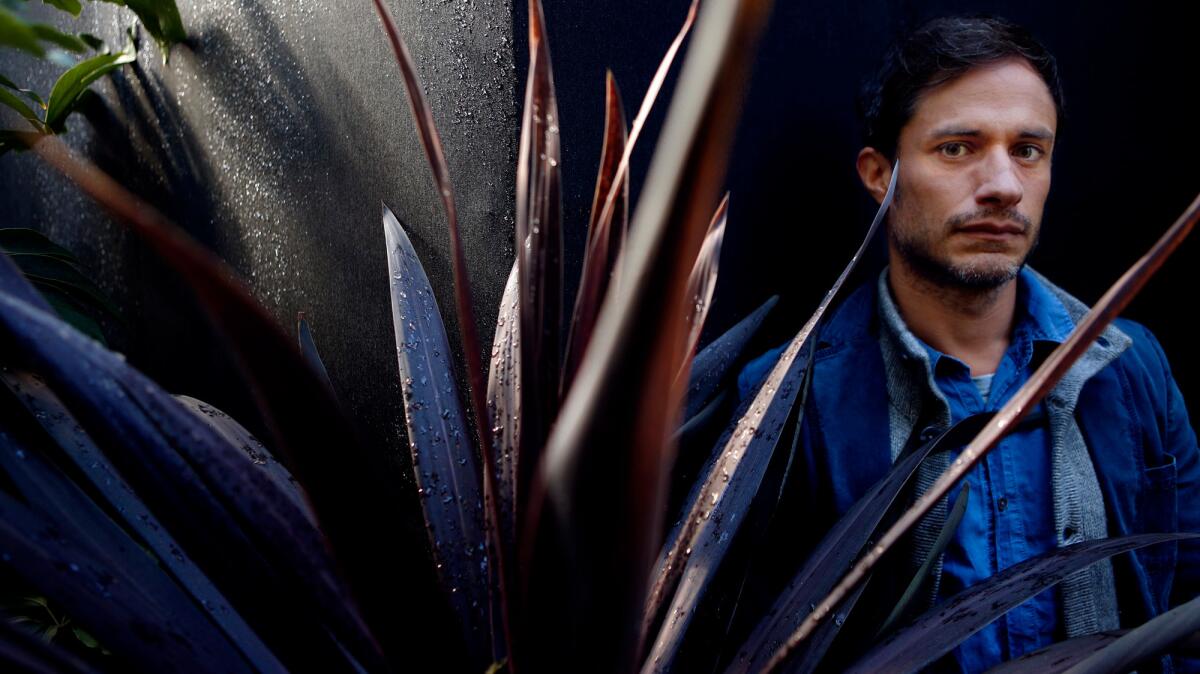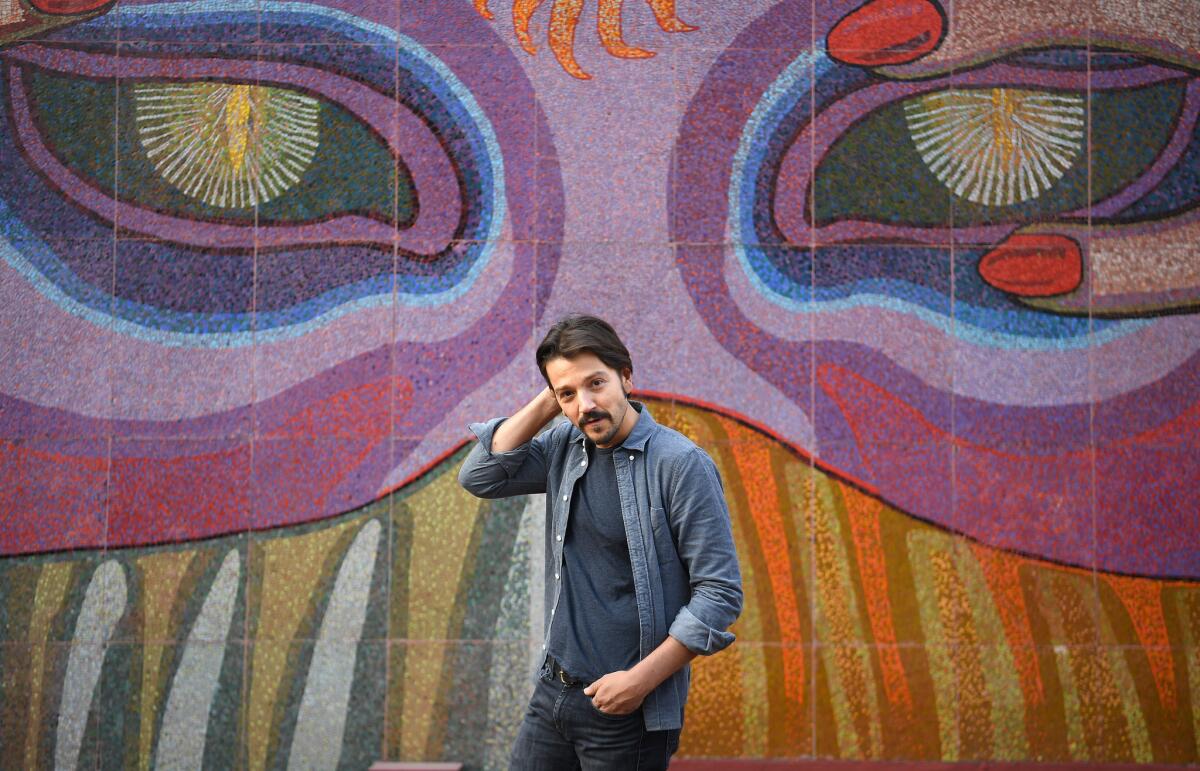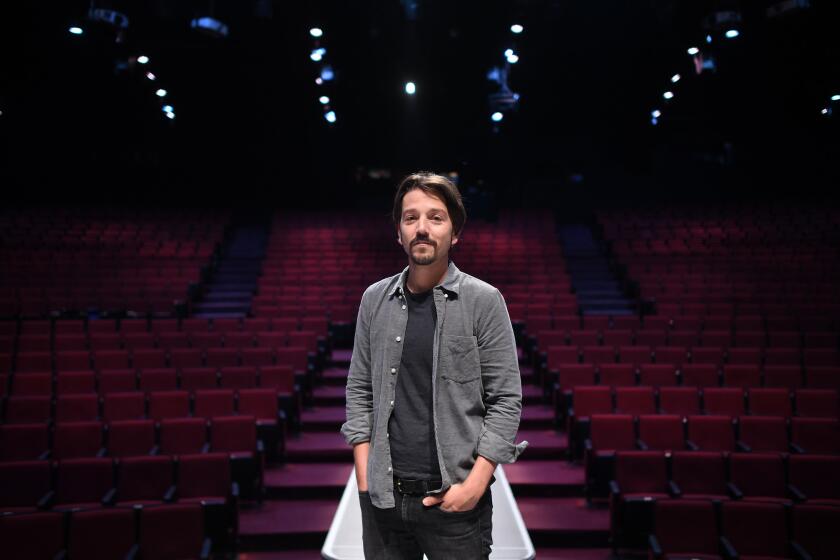Abortion talk at dinner? Inside Diego Luna’s contentious new TV show
- Share via
For Diego Luna, the dinner table is the perfect venue for contentious debates.
With “Pan y Circo,” his new show on Amazon Prime Video, he hopes to drive that point home and to encourage those watching to dive into equally difficult conversations around the table with their friends and family.
The show’s premise is simple, almost quaint: Gather six guests who are invested in key issues affecting the modern-day world (racism, immigration, gender violence), ask them to share a meal prepared specifically for them by a renowned chef, and let the conversation go where it may.
In his role as host (a moniker all the more apt given the show’s format), Luna positions himself as a table-setter. He arrives at these dinners hoping to learn and to listen. But, as a recently recorded virtual episode on a post-COVID world highlights, the spirit of the series is tied to a reality that already seems almost unrecognizable.
Five years ago, actor Diego Luna was living the Hollywood dream.

To watch Luna share a meal with his rotating roster of guests, which includes actors Gael Garcia Bernal and Ana de la Reguera, rapper Dayra Fyah, activist Dapthne Cuevas and ecologist Julia Carabias Lillo, among others, is to time-travel to a moment when such intimate get-togethers were common, even if they were mostly taken for granted.
Wanting to address the increasing polarization he saw take place following Mexico’s last election, Luna decided to create a space where conversation, not conflict, was the guiding principle. “We have to start listening to each other, you know?” he says. “Because it’s not happening anymore, and social media is not helping us at all.”
Amid lockdowns and protests, “Pan y Circo’s” message feels all the more urgent. “We don’t have time anymore,” Luna says. “And when I set the table, I do make the time. For me, sitting down and having the chance to eat something, it’s a gift. It’s something I don’t take for granted. So, my feeling is like, if we think about conversation as we think about food, we would respect others much more than how we do today.”
Which is why every episode’s meal tells a story in itself. For Alejandra Barbabosa, head chef of San Andrés Cholula’s Recaudo, such a task came with its own obstacles. Creating a three-course meal for the episode on abortion in Mexico — where the procedure remains illegal or highly restricted in many states — was no simple matter, she found.
“You don’t want to make it too explicit with a topic like this one,” she says. “What do you want to show? What do you want to reveal? They truly made me think hard about how to accomplish this. But I knew I had to follow the guidelines we have here in Recaudo. We use seasonal ingredients. We’re vegetarian. We source locally. So I was married to bringing that into the menu.”
The result? A cream of Chilacayote served with matured sheep cheese and quail eggs with safflower, followed by calabaza de Castilla croquettes served in a pepita adobo. For dessert? A sweet potato mousse with date almond brittle drenched in a cempasúchil sauce garnished with flower petals. Eggs, seeds, flowers. The imagery was hard to miss.
Luna’s show joins a budding canon of docuseries intent on encouraging audiences to reevaluate their connection to the food they consume.
If Hulu’s “Taste the Nation With Padma Lakshmi” unearths the way food is inherently political and Netflix’s “Down to Earth With Zac Efron” inadvertently reveals how cultural blindspots are necessary learning opportunities, Luna opts to focus on yet another generative feature of our connection to what we eat.
David Chang, Momofuku chef and host of Netflix’s “Ugly Delicious” and “Breakfast, Lunch & Dinner,” says “praise is the absence of criticism.”
“My idea was to try to make people realize that through food and through the beauty of sitting together, sharing a moment,” Luna says, “we could actually find a way to realize that we’re not as far as we believe we are from each other.”
For Barbabosa, witnessing “Pan y Circo’s” makeshift roundtable on abortion offered a template for how these talks can be replicated all over the world. “To me it was very interesting because it’s a topic that needs to be talked about. It needs to stop being taboo. We need to make it, quite literally, a topic that you can bring to the table.”
Marion Reimers Tusche, a Mexican activist and sports analyst who took part in the show’s gender violence episode, saw in Luna’s approach a productive way of nurturing the kinds of discussions many shy away from.
“In Latin America, I think,” she says, “there’s generally an aversion to debate or to confrontation. In Mexico, for instance, there’s always a feeling of, ‘Ya, salud! No bueno, vamos a pasar a otra cosa’” [Enough, cheers. No good, let’s move on to another thing]: Conversations are cut short lest they lead to uncomfortable places. It’s a testament to “Pan y Circo” that, even amid the civility that characterized its debates, there was no shortage of passionate disagreements.
For Reimers Tusche, this was necessary. “These are issues that affect us, that interest us, and all of us have a genuine concern for the country’s current situation. Obviously that would lead to a heated debate. I would’ve been worried if we hadn’t been so passionate. What we do always need to keep in check is for it to not turn into a toxic conversation.”
Take the episode “Look at Ourselves in the Mirror,” which centers on racism in Mexico and includes indigenous advocates like linguist Yásnaya Elena Aguilar, famed Mixe soprano María Reyna and Mapuche journalist Pedro Cayuqueo. As Cayuqueo recalls an uncomfortable exchange with a fellow in his hotel who’d taken offense to his earnest question about the person’s indigenous ancestry, Cayuqueo finds himself called out for claiming kinship with Reyna and Aguilar, both of whom, he notes, look like members from his community back in Chile.
Rogelio Jiménez Pons, the director of Mexico’s tourism board Fonatur (the agency in charge of the embattled Maya train project), sitting a few spots away, is rankled by what he sees as reverse racism: “Note that in your racism,” he tells Cayuqueo without a hint of irony, “you don’t consider us mestizos to be related to you.” Due, perhaps, to the otherwise jovial environment at the table, Jiménez Pons’s words cause a raucous outburst of laughter.
Filmmakers Shaul Schwarz and Christina Clusiau delve into “Immigration Nation,” their shocking Netflix docuseries about ICE, immigrants and a broken system.

But the claim is not left unchallenged: Aguilar patiently explains why “reverse racism” is not real (she’d have to subject him to lifetimes of oppression for him to be able to claim such a thing exists). Cayuqueo goes even further, saying later that, having been invited to such a table, he’d gladly extend an open hand yet again to those who felt aggrieved by his words, in order to have a productive conversation.
Even when it’s so gracefully deescalated, such a scene shows the promise and perils of “Pan y Circo,” which depends on and reveals the many privileges and disadvantages of those invited to take part.
“I sat down [at] that table, thinking, ‘Well, I’m not a racist,’” Luna recalls. “But I do get advantage from a system, and that I didn’t know so well, so clear.”
Luna hopes “Pan y Circo” emboldens others to see how tough debates can nurture necessary self-reflection. “Don’t waste any more of your time when you’re sitting at the table with other people, sharing food,” he says. “That is the place where you have to be talking about what matters.”
More to Read
The complete guide to home viewing
Get Screen Gab for everything about the TV shows and streaming movies everyone’s talking about.
You may occasionally receive promotional content from the Los Angeles Times.







